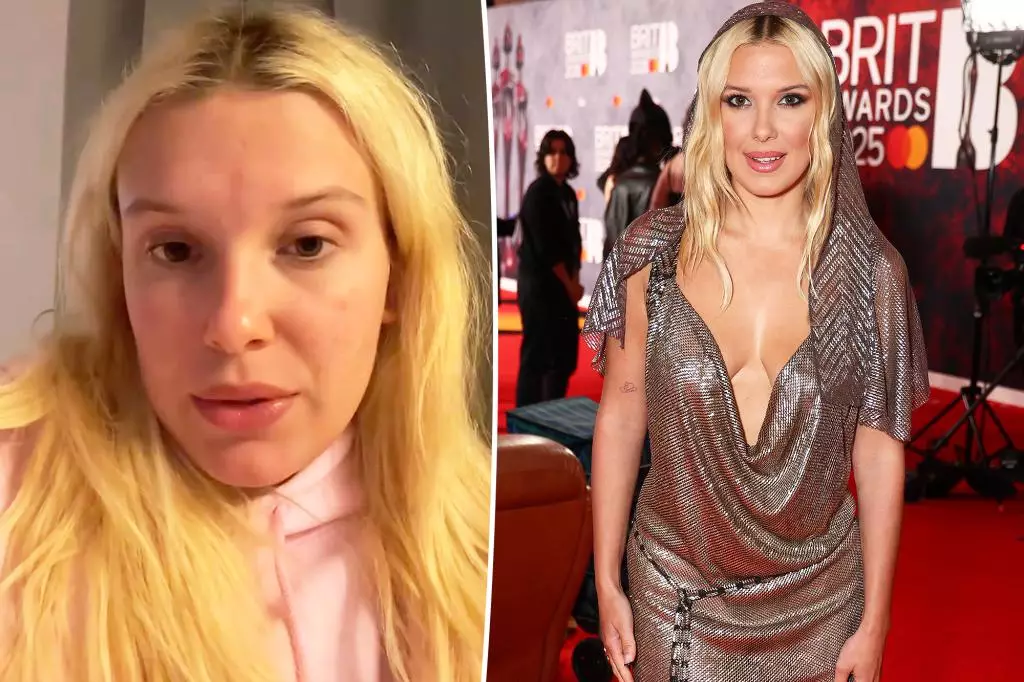Millie Bobby Brown, renowned for her captivating performances in “Stranger Things” and “Enola Holmes,” took a brave step forward by addressing the unwarranted scrutiny of her appearance in the spotlight. Following her recent appearance at the premiere of “Electric State,” the 21-year-old actress faced a slew of dismissive comments regarding her looks, with critics daring to claim that she appeared “old.” In a poignant Instagram video, she articulated her frustrations, exposing not just her personal struggle but shining a light on the pervasive issues that young women encounter when thrust into the public eye from a tender age.
Brown’s message is a clarion call for understanding and compassion toward public figures, particularly women, who are frequently judged based on arbitrary and unrealistic beauty standards. Having entered the entertainment industry at just 10 years old, she finds herself in a peculiar position—growing older while the audience clings to a static image of her childhood persona. This disconnect, Brown argues, is detrimental not just to her, but to every young woman navigating similar dilemmas in a world obsessed with appearance.
It is profoundly troubling how society expects individuals, particularly women, to adhere to a sort of “frozen in time” ideal. Brown pointedly noted how critics often desire her to remain as the child they first adored, validating a misconception that undermines the natural evolution of young women into adulthood. Her self-assured response serves as a reminder that aging is not a flaw but a facet of human experience that should be celebrated.
The actress’s resolve to reject this madness—and the notion that she should shrink herself to meet the narrow confines of public acceptance—is commendable. She passionately asserted, “I refuse to make myself smaller to fit the unrealistic expectations of people.” This statement resonates as a powerful affirmation for individuals everywhere, as it challenges the expectations thrust upon them by a voyeuristic society that prefers immobility over natural growth.
One of the most striking elements of Brown’s statement was her critique of the media, particularly shedding light on how female writers partake in the scrutiny of her appearance. This divisive behavior perpetuates a cycle where women are pitted against each other, often leading to internalized misogyny. The actress remarked on the unsettling nature of adults spending time dissecting her physicality rather than uplifting her artistry. This behavior highlights an uncomfortable truth: women’s worth is frequently measured against arbitrary standards of beauty rather than their accomplishments or capabilities.
Brown’s commitment to not accept shame for her choices or her body is an invaluable message amidst a culture that is often quick to judge. The very audacity of publicly celebrating one’s growth—physical or otherwise—stands in stark contrast to a societal tendency to criticize change, particularly when it belongs to young women stepping into their identities.
In her address, Brown implored society to shift its focus from critics to supporters, advocating for a culture that prioritizes compliments over condemnation. “We have become a society where it’s so much easier to criticize than it is to pay a compliment,” she accurately pointed out. This sentiment serves as an invitation for collective introspection—how often do we default to negativity rather than recognizing the accomplishments and growth of others?
The push for a healthier dialogue, both online and offline, is essential. Acknowledging the courage it takes for individuals to express themselves authentically while navigating a minefield of judgment is vital for fostering a more supportive environment for future generations. When public figures, especially women like Brown, rise to challenge the status quo, it presents an opportunity for society to correct its course and prioritize kindness and understanding.
Millie Bobby Brown’s stand is more than a response to superficial criticism; it is a revolutionary appeal to create a culture that embraces change, celebrates personal growth, and, perhaps most importantly, nurtures the belief that women can, and should, grow into themselves without fear of judgment.

